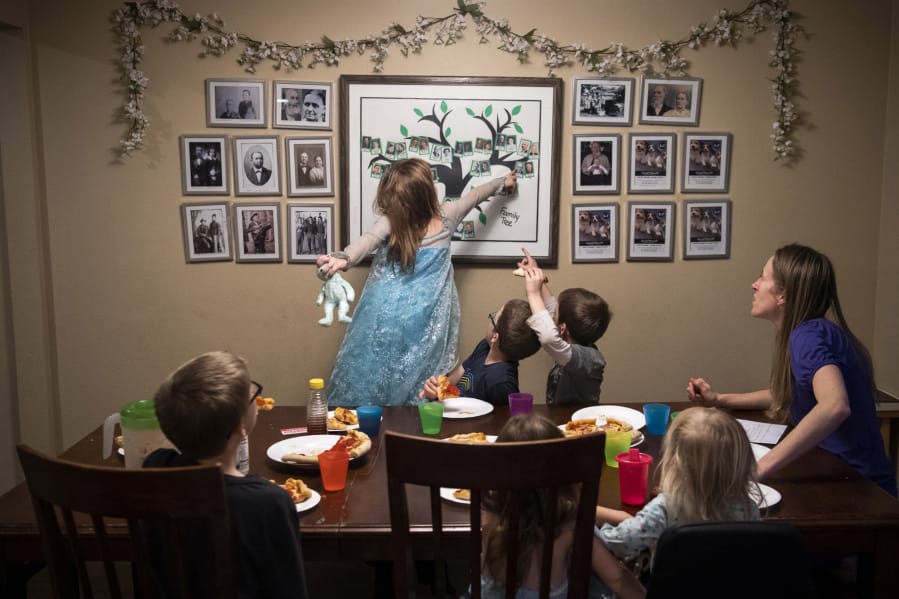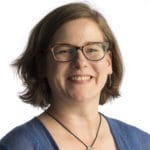After Jonah and Charlotte Barnes learned about research linking children’s knowledge of family history to their general well-being, the couple vowed to teach their own kids about their roots.
The Vancouver couple’s new book, “Turning Little Hearts,” seeks to help other families do the same. The workbook contains 90-some activities to connect children to their ancestors.
“The point of the book is to help parents share stories in short, sweet, fun, engaging ways so children can learn the stories and not get bored by them,” said Charlotte, 34.
The effort doesn’t have to be complicated for the parents, either.
“I’m terrified that people will think they have to be family history freaks or genealogists,” said Jonah, 36. “The point is just to tell more stories.”
The couple have six children, all younger than 10. They moved to Vancouver, where Jonah grew up, in 2017 after purchasing the Sunrise Bagels wholesale business. The book’s origins, however, date to when the family lived in Arizona.
Jonah was working at his desk job when he felt his heart start to race and pound. At just 28, he thought he was having a heart attack.
“As a young guy, the illusion of invincibility and immortality vanished in an instant,” Jonah said.
He was diagnosed with paroxysmal atrial tachycardia, a type of irregular heartbeat that’s not generally life-threatening.
“But I kept thinking, ‘What if I died?’ Which made me think of my children. I wrote a history of who they are,” Jonah said. “I started looking at family history because I didn’t know anything, and it changed the way I think.”
Charlotte noticed that their kids were keenly interested in the family tales. “The children could recite these stories to every detail,” she said.
Then Charlotte and Jonah happened upon Bruce Feiler’s New York Times article “The Stories That Bind Us.”
The article cites research by Marshall Duke and Robyn Fivush. The psychologists developed a “Do You Know…?” scale based on 20 questions, including: Do you know how your parents met? Do you know which person in your family you look most like? Do you know some things that happened to your mom or dad when they were in school?
Duke and Fivush found that kids who know more about their family history have greater self-esteem and resilience.
“When we read that article, that’s when it took off,” Charlotte said. “We started covering every wall with pictures.”
Charlotte and Jonah, members of The Church of Jesus Christ of Latter-day Saints, already had experience researching their family histories. They met in the library at Brigham Young University doing just that. She thought he was cute, went up and said “hi.” A month later, they were engaged.
After his health scare, Jonah worked on a book about how family stories shape children, and he sent it to three publishers. One publisher was interested but didn’t want the bulk of the book, just more activities like the 10 at the end that Charlotte developed. So she created many more.
“My sweet wife churned out over 90 of these things,” Jonah said. And those activities became the “Turning Little Hearts” workbook, published this month by Utah-based Cedar Fort ($14.99).
Some activities might be more pertinent for Latter-day Saints, for example the “Mission Map,” to mark where ancestors served as missionaries. But most activities would work for any family — drawing a map of ancestors’ immigration routes, researching a namesake, or celebrating an ancestor’s birthday.
Charlotte and Jonah stress that these activities can be easy. They are not about achieving Pinterest-levels of perfection.
For example, Charlotte’s father, Robert Judson Clark, a Princeton University professor emeritus, died in 2011. To celebrate his birthday in August, the family ate his favorite treat, Pepperidge Farm Geneva cookies.
“You’re always looking for things to do with your kids anyway. This is something that’s meaningful. I have gained so much insight myself,” Charlotte said.
As she and Jonah delved into the benefits of knowing family history, they learned that ancestors’ stories fill our need for belonging, while also lending a sense of uniqueness and strength. They show how ancestors’ decisions affected their lives and even those of descendants, which can help young people develop forethought.
It’s even good for kids to learn about the black sheep of the family, Jonah said. What’s powerful is hearing about both ups and downs.
“Parents get hung up on teaching a lesson,” he said. “Don’t overthink it. You don’t have to have a great moral. It’s letting kids know, ‘You’re part of a bigger story. You’re a chapter in a long book. You’re more than some lonely kid in middle school.’ “




